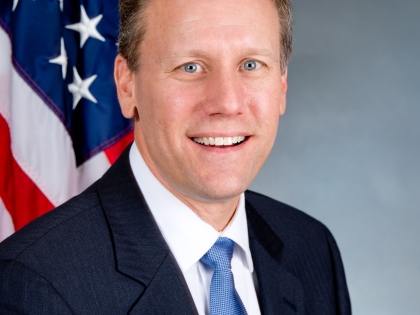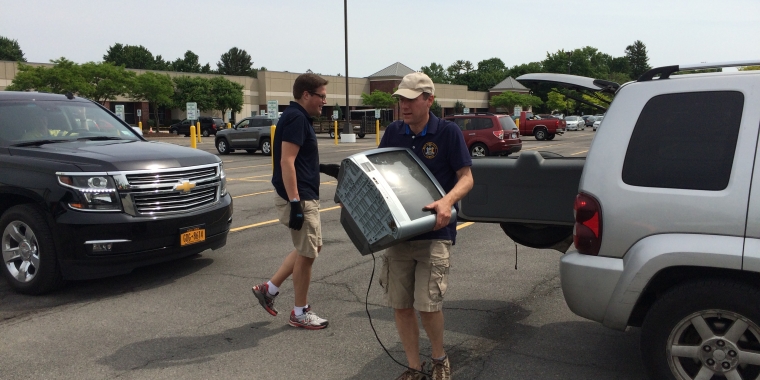
IDC still powerful in the Senate: Avella
FEBRUARY 26, 2015
By Madina Toure
When state Sen. Tony Avella (D-Bayside) first joined the Independent Democratic Conference, a group of rogue Democrats in the state Senate, he praised the group for its ability to overcome partisan lines and get things done.
Now that Republicans have the majority in the upper chamber of the state Senate, he concedes “the jury might still be out” on whether the IDC remains relevant.
But he insists that the group is still relevant, saying that it continues to have a working relationship with the Republican conference and still has influence.
“We have the ability to hopefully put bills on the floor,” Avella said in an interview last week. “We hopefully have the ability to be a serious part of the budget negotiations and we have relevance. As long as we can get things done that I think are important for my constituents and New Yorkers, this is a good thing.”
And he emphasizes that since he joined the group, he has been able to pass a number of bills.
Last year, he said, he was able to get $6.5 million in capital funds for his district, which includes $1.7 million for the schools, $1.3 million for parks, a $2 million grant to Queens College to update its science and research labs and $100,000 for three senior centers in danger of closing. He was also able to allocate $500,000 to the MTA to study the bus service in northeast Queens.
“Look at the 17 bills that I got passed last year,” he said. “If I had been in the Democratic conference, that would not have happened.”
The IDC is a five-member faction of breakaway Democrats. Its current members are Avella; Sen. Jeff Klein (D-Bronx), IDC head; Sen. David Carlucci (D-Rockland/Westchester); Sen. David Valesky (D-Oneida); and Sen. Diane Savino (D-Staten Island/Brooklyn).
Last February, Avella said he would leave the formal Democratic Party to become a member of the IDC.
In June, Democratic state senators in Albany agreed to re-establish ties between the mainstream party and the IDC in a move that would take effect after the fall 2014 elections.
Avella said the agreement made last year during the campaign was that if they could form a Democratic majority, the IDC would still be a separate conference but it would join with the Democratic conference to form a Democratic majority coalition. But the deal faltered given that the Republicans won a majority.
State Sen. Michael Gianaris (D-Astoria) said Democrats should stick together to advance the “progressive agenda their constituents demand” and that Senate Republicans continue to block key proposals such as an increase in the minimum wage, protections for women and real ethics reforms.
“Senators who have aligned themselves with the Republican opponents of these and other significant issues have not succeeded in making them a reality,” Gianaris said in an emailed statement. “As always, I look forward to working with all senators who share an interest in a New York that is more fair, equal and ethically sound so that we can achieve a government that looks out for all New Yorkers.”
Robert Pecorella, associate professor of government and politics at St. John’s University, said the IDC was a “great idea” when the Democrats got into the majority and that it is successful at getting “the right and the left to talk to each other.”
But with a Republican majority, he said, the IDC is “largely irrelevant.” He suggested that Sen. Dean Skelos, the Republican majority leader, from Nassau, may be maintaining his relationship with Klein and the rest of the IDC because the Republicans could need them again in the future.
“It’s a numbers question,” Pecorella said. “You need 32 votes to pass. Right now, the Republicans don’t need the IDC for that. In the future, Skelos might need that bridge, but right now they’re a bridge without necessity.”
Pecorella said the IDC could become relevant again if the Democrats regained the majority, but the next time the Senate majority could change is 2016.
The Republicans currently have outright control with 32 members, as 32 votes are necessary to pass anything in the Senate. Simcha Felder, a Brooklyn Democratic senator, sits with the Republican conference, giving the Republicans another vote.
There would have to be two special elections in which Democrats would win two seats, which Avella said is “unlikely.”
“It’s not going to happen for two years,” he said. “There has to be an election. So we’re talking about the next election, obviously. There would have to be another discussion between the IDC and the Democratic conference.”
Avella said Republicans and Democrats disagree on a number of issues, including campaign financing, the DREAM Act for college age immigrants and the 10 points of the Women’s Equality Agenda, but that they should try to find common ground on other issues.
“Over the next two years, we have to recognize that there are going to be differences and that the Republican conference is not going to pass some of the things that Democrats like myself would like to get passed,” he said. “But that doesn’t mean we shouldn’t work together on other issues where we can agree.”
http://www.timesledger.com/stories/2015/9/idcnow_tl_2015_02_27_q.html


